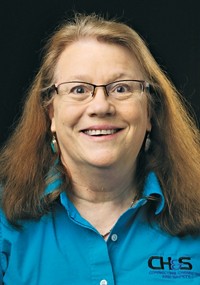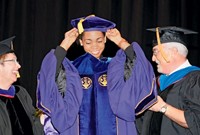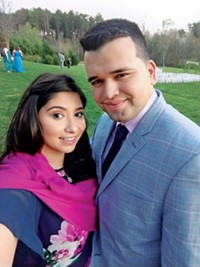Advertisement
Grab your lab coat. Let's get started
Welcome!
Welcome!
Create an account below to get 6 C&EN articles per month, receive newsletters and more - all free.
It seems this is your first time logging in online. Please enter the following information to continue.
As an ACS member you automatically get access to this site. All we need is few more details to create your reading experience.
Not you? Sign in with a different account.
Not you? Sign in with a different account.
ERROR 1
ERROR 1
ERROR 2
ERROR 2
ERROR 2
ERROR 2
ERROR 2
Password and Confirm password must match.
If you have an ACS member number, please enter it here so we can link this account to your membership. (optional)
ERROR 2
ACS values your privacy. By submitting your information, you are gaining access to C&EN and subscribing to our weekly newsletter. We use the information you provide to make your reading experience better, and we will never sell your data to third party members.
People
Movers And Shakers
Amy K. Paris
Following her brother into the ACS Scholars Program, this engineer discovered her passion for chemical process safety
by Susan J. Ainsworth
December 20, 2010
| A version of this story appeared in
Volume 88, Issue 51
Growing up on a dairy farm in Checotah, Okla., Amy K. Paris developed an early interest in science. “I like to joke that my brothers and I were ‘engineering’ things from the time we were little kids,” says Paris, who is an advanced chemical engineer at Eastman Chemical in Longview, Texas. “We liked to take things apart—any little piece of farm equipment we’d find lying around—and we’d have to put it back together before Mom caught us,” she says with a laugh.
Sharing his natural curiosity for science, Paris followed her older brother, John, into the chemical engineering program at the University of Arkansas, Fayetteville. Like him, she applied to the ACS Scholars Program, which awards renewable scholarships of up to $5,000 per year to minority students who want to enter chemistry, chemical engineering, or related fields. John had been in the very first class of ACS Scholars in 1995. Amy was selected as an ACS Scholar in 1999. Their father’s side of the family descends from the Cherokee Nation, a Native American tribe.
As an ACS Scholar, Amy Paris says she benefited most from the mentoring she received from Col. William A. Myers, who is now retired but was then assistant head of the university’s chemical engineering department. He also served as her brother’s ACS Scholars mentor. “He was there for me day in and day out, whenever I needed him,” she says.
Myers advised Paris on everything from selecting classes to managing the stress of her coursework. He was also a great resource and encouraging voice for her when she was deciding about pursuing a graduate degree in chemical engineering.
Although Paris had expected to go to work in industry when she finished her bachelor’s degree, her plans changed during her senior year when she took a chemical process safety course. Studying about incidents such as those at Bhopal, India, in 1984, and Flixborough, England, in 1974, she was struck by how “preventable” they seemed to be, she says. “I just wanted to continue to study chemical process safety and see what there was that I could do to make a difference and keep catastrophic events from happening again.”
She pursued a graduate degree focused on chemical process safety at the University of Arkansas, which boasts a Chemical Hazards Research Center. Being able to conduct research on the consequences of the atmospheric release of hazardous materials more than captured her interest, she says. “It was a cool four years.”
Not surprisingly, Paris’ knowledge of chemical process safety gave her an edge in landing a job at Eastman immediately after finishing her Ph.D. in 2008, she says. She is able to draw on that background in her work, which focuses on developing new technology for producing specialty chemicals in the company’s pilot plant. “I absolutely love my job,” she says. “It is really hands-on and it is really diverse.”
Paris credits the ACS Scholars Program with helping her get where she is today. As an ACS Scholar, she benefited from going to ACS national meetings, where she met impressive scholars from other backgrounds, she says. “It made me want to work hard to live up to the standards of all these other people in the program.”
Even though she was accepted into the program more than a decade ago, Paris still feels very much a part of the ACS Scholars family. In August, for example, she participated in a symposium celebrating the 15th anniversary of the ACS Scholars Program at the ACS national meeting in Boston.
In addition, Paris was recently recruited to act as a mentor in a new online mentoring database for ACS Scholars. In this pilot project, new ACS Scholars can log in to the system and search through a list of profiles of former ACS Scholars who are now pursuing graduate studies, working in industry, or teaching. The protégés can then find a prospective mentor who shares a similar background or career goal with them.
Those who know Paris have no doubt that she will be a great adviser to young scientists. “Amy was definitely one of the leaders in our graduate program,” says Heather Walker, a research assistant professor in Arkansas’ chemical engineering department and experimental director of the Chemical Hazards Research Center. “She had very strong engineering skills and equally strong people skills, which is an exceptional combination.”
It seems likely that Paris’ early learning experiences on her family farm helped shape her into the engineer she is today. A fastidious researcher, “Amy was one of the most independent students I’ve ever seen in the lab,” Walker says. “She didn’t mind getting her hands dirty,” she adds. “If any of the equipment needed to be moved or changed, she enjoyed the challenge and would jump in with tools to get things back on track.”










Join the conversation
Contact the reporter
Submit a Letter to the Editor for publication
Engage with us on Twitter